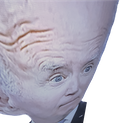@Philosophosphorous@hexbear.net here mentioned Daoism, and I'd like to drop this article from Red Sails that compares and contrasts Daoism with Dialectical Materialism. This isn't a mythology as you asked, but hopefully you may find it useful. There are similarities between when it comes to seeing the world as a constant flow with a unity of opposites. There are differences too, where Daoism sees change as cyclical (no progress) while Dialectical Materialism sees change as an upward-moving spiral (contradictions move systems forward and their "overcoming" moves the system to a higher set of contradictions). It also gives a good explanation of Dialectics.
The article also discussed how Daoism influenced Mao and his military ideas.
Here's the article: https://redsails.org/maoist-and-daoist-dialectics/
In terms of stories, there's also an article on Red Sails of three short stories (one of which is very Daoist) and how they relate to ideas from Dialectical Materialism.
Here are the stories: https://redsails.org/on-three-short-stories/#fn8
Yeah the dissolution of the Soviet Union isn't really a story of a "totalitarian regime" cracking down and tightening control before the masses come swooping in to restore "democracy", but more of a counter-revolutionary overthrow allowed to occur via factions within the Party either by the naivety or malice of Gorbachev. In fact, surrendering state control of the media to capitalist forces is an important aspect of the Soviet Union's dissolution. The media was allowed to fall into the hands of capitalists who were also encouraged to criticize and deligitimize the CPSU.
Some long quotes from Keeran and Kenny's Socialism Betrayed:
In April 11 1985, for example, Gorbachev called for the release of more administrative information to the public. Soon, Gorbachev transformed glasnost’s meaning from openness by the Party and other bodies, to open criticism of the Party and its history.
In June, the General Secretary met with media officials and urged them to support the reform effort by making “open, specific, and constructive” criticisms of shortcomings. Soon after, the newspaper Sovetskaya Rossiya criticized the Moscow Party head, Viktor Grishin. Gorbachev then replaced him with Boris Yeltsin, a presumed ally.
...Yuri Afanasyev, soon a partisan of Boris Yeltsin, became head of the Moscow State Historical Archives. These men soon took leading roles in criticizing Stalin and the Party and pushing the most rapid and extreme reform measures
... In short, Gorbachev began to encourage intellectuals and the media to criticize the Party and Party history, while simultaneously diminishing the role and authority of the Party over the media. Indeed, he did not simply diminish the Party’s oversight of the media, he actually turned the media over to people who were hostile to the CPSU and socialism.
... Gorbachev opened the door to criticism without limits. “It is time for literary and art criticism to shake off complacency and servility…and to remember that criticism is a social duty.” The next month, Gorbachev and Ligachev met with representatives of the mass media, and Gorbachev said that “the main enemy is bureaucratism, and the press must castigate it without backing off.” A truly anomalous situation thus emerged. The General Secretary, who was the leader of the Party and who had the power to reform the Party and government, was inciting attacks from the outside on those very entities, as if he were a mere bystander, not ultimately responsible for them
... Mike Davidow, a Communist journalist stationed in Moscow, rued, “Never in history did a ruling party literally turn over the mass media to forces bent on its own destruction and the state it led, as did the leaders of the CPSU.”
... Boris Kargarlitsky noted the enormous irony of a powerful campaign in support of privatization unleashed in 1990 by television, newspapers and magazines in most cases still controlled by the Communist Party. “Anyone who doubted the new wonder-working recipe was not allowed to be heard.” The Soviet media monopoly was now capitalist.
Just like Dream Scenario 
This reminds me of my disappointment with the Prolekult video on the topic when the Ukraine war broke out. Pretty much simplifying it to an imperialist struggle between Russia and the West. And every other leftist group in my area had the same take, at best. Then Oct 7th broke their brains further. What a wasteland here in the West.
Thanks for the response. There's a lot of info (as I like posts to have ;) ) so I'll chew on it a bit. And I agree with you as you are right in that there are examples in sutras where people have insights into their past lives, the Buddha talks about his past lives as well, so the question can't be viewed as unanswerable in the absolute sense.
I suppose I meant that it may not be skillful means at an earlier stage of engagement with Buddhism to linger on such questions - though obviously I'm taking a lot of energy talking about my own views on it so I'm either not being skillful myself or I just do find it interesting to think about. The Sabbsava sutras lists similar questions as unskillful questions to ask. But, as I mentioned and as I'm doing now, I think it can be fruitful to go back to these types of questions and answer them at higher and higher stages each time.
Perhaps it can be unskillful if one approaches these questions with a false conception of self, as viewed as some self-propelling svabhava-having entity moving from one body to the next?
But I haven't reached enlightenment yet. So I'm stuck with words.
Now I have some more works that can inform my practice, thanks!
My own working interpretation, and note this is from what I've read and thought about, and I may have my blind spots, is that this specific question is likely another version of one of the unanswerable questions the Buddha warns against, being some variation of questions such as "what was I in the past?" or "who will I be in the future?" or, as may be more clear later, "what are the precise results of karma?".
These are unanswerable because they distract from the practice, and are sorta ill-posed. Though I do think there can be some benefit to revisiting these questions at higher and higher stages to further see how they may be ill posed.
For me, the idea that there must be a one to one matching of previous lives to future lives is still accepting a concept of identity between lives (and also identity within a life) and emphasizing identity over continuity - reincarnation instead of rebirth.
As there is no permanent residing self, there can be no permanent residing self that gets one-to-one placed in a new body at the time of death. There isn't a self, but the unborn, the Buddha-nature. We are this Buddha-nature, we are an instance of the universe's own awareness. And this Buddha-nature cannot be born, die, or even be reborn. My current, unenlightened, analogous concept for this is to think of it as "awareness", though any word couldn't actually describe it.
As bodies with organs to sense and think, there is a long continuous stream of ever changing sense impressions and mental concepts. This is the mind-stream. Here, from context with the world, from identification with thoughts, from the stories and self-talk we constantly engage in this illusion of self gets constructed. We don't realize ourselves as the unborn, as the Buddha-nature we all are, we conceptualize ourselves as something distinct, distant, and separate from it. And we falsely identify ourselves with an ever changing and ephemeral phenomenal known as self.
Why did I bother with this long tangent, because some confusions regarding rebirth can derive from a subtle acceptance of self as having permanent substance, a self-causing substance, or what can be called svabhava. If so, the one tends to imagine reincarnation instead of rebirth. And there is a difference between the two.
While we're unenlightened our actions produce effects, the chain of cause and effect continues, and this shapes the context and form of new life. This is karma. As long as there are unenlightened beings, the Buddha-nature of those beings will be occluded by their self-concept. Their self, and their mindstream, will be a result of previous actions. Many actions. In Buddhism, the idea of codependent origination is central. There is no one cause to phenomenon, the rebirth of self included. There are a host of causes that condition future self- formations on present and future beings.
Any continuity you can find, and you are bound to find a continuity due to codependent origination, between iterations of self (within and between beings) can be seen as rebirth. Rebirth is the continuous reconstitution of the false idea of self in ourselves and in others, tied together by karma. There isn't identity between self-formations, but there is continuity. And perhaps it's possible that any angle of viewing the continuity is equally valid.
Now I am taking this from my readings in Tiantai Buddhism. Others may be more strict on saying there is exactly one karmic line from one life to the next to the next. So I'm possibly being heterodox (Tiantai can be a little heterodox at times).
But I still hold that the confusion about "does one life segue into exactly one next life, how does that work if the previous number of lives doesn't equal the next" starts to meaningless and like the wrong phrasing of the question as my journey continues.
But also, as others said. There are no shortage of lives, realms, and beings that are in samsara. The Buddha-dharma is everywhere and in everything.
Can confirm. SC is bad y'all
I've been reading parts of the Gundrisse, and there's a section part from Notebook VII, Capital as Fructiferous, that struck me as relevant to the inevitability of underdevelopment for capitalism. The theory nerds here could probably point to some more succinct passage that I've yet to come across, though, or if I'm misinterpreting
The growing incompatibility between the productive development of society and its hitherto existing relations of production expresses itself in bitter contradictions, crises, spasms. The violent destruction of capital not by relations external to it, but rather as a condition of its self-preservation...
... Hence the highest development of productive power together with the greatest expansion of existing wealth will coincide with depreciation of capital, degradation of the labourer, and a most straitened exhaustion of his vital powers. These contradictions lead to explosions, cataclysms, crises, in which by momentaneous suspension of labour and annihilation of a great portion of capital the latter is violently reduced to the point where it can go on. These contradictions, of course, lead to explosions, crises, in which momentary suspension of all labour and annihilation of a great part of the capital violently lead it back to the point where it is enabled [to go on] fully employing its productive powers without committing suicide. Yet, these regularly recurring catastrophes lead to their repetition on a higher scale, and finally to its violent overthrow.
I've seen this argument used before to explain how the destruction of the World Wars benefitted capital, but I haven't come across a discussion w.r.t. general undevelopment (aside from stagnation due to the fuckeries of financialization)
No, history is over now. Materialism is dead. The old rules no longer apply. We have the internet, cell phones, and reddit upvotes. It's uncharted territory
I have been told from multiple people "Don't you want somebody who doesn't make us look so embarrassing?"
It baffles me. Their big gripe with Biden and Trump is that they are embarrassing.
They want a competent genocide and a stylish boot others' necks
I actually like sports because Americans lose and cry and piss their pants
The dooming over this was getting annoying. I'm glad people were pushing back on it and reminding everyone to breath and also think about it for more than the five seconds it takes for whatever odd impulse response was forming with some.
Could events such as the Jackson water crisis be viewed as this process of undevelopment? What are your thoughts. Though not related to gigification of labor, like you said, there is a process of infrastructure failure that just becomes the new norm.
And I do think there is something to this idea of undevelopment, and it's interesting to think about what it means for any proletariat in the US. Especially once the surplus from the empire dwindles
Americans just label themselves things. Western leftists are unfortunately not very serious, they just want to find a good label to use, so call themselves whatever flavor of communism seems cool as they vote for a cop. Then when it gets boring they drop it and move on
I should revisit Gaucho. I love Steely Dan, but for some reason that was the album I had a hard time getting into. It didn't help that if had to follow up Aja. But I'll give it another listen, thanks!
Most progressive vice president since Truman




